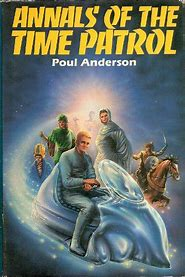Ermanaric, lame in hand and foot and in endless pain, looks at Wodan's Wain and the Eye of Tiwaz and says:
"'I did not heed you, gods.'..." (p. 464)
Is he about to confess? Not in any terms that we would recognize. He continues:
"'I trusted in my own strength. You are more tricky and cruel than I knew.'" (ibid.)
Has Ermanaric experienced trickiness and cruelty or some measure of justice and the consequences of his own actions? He recognizes that:
"...the men who fell with Hathawulf and Solbern, the flower of the East Goths...would have hurled back the Huns, Ermanaric at the forefront." (ibid.)
Instead, his Ostroths will be defeated and subjected and Ermanaric cuts his own throat, while hearing thunder like "...the Hunnish midnight." (p. 465)
Annals Of The Time Patrol, now superseded by Time Patrol, collected two collections:
The Guardians Of Time, culminating in "Delenda Est," about an altered timeline;
Time Patrolman, culminating in "The Sorrow of Odin the Goth" and thus in Ermanaric's death and "Hunnish midnight."
Subsequent additions to the Time Patrol series revised the order of the stories.

1 comment:
Germanic pagans simply didn't think in terms of confession and absolution. Or forgiveness, much, either.
Right and wrong were generally speaking, -particular- to them. Human beings didn't have rights, for example: specific -categories- of human beings had -specific- rights.
Post a Comment